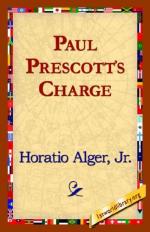Next, he came to a place of public amusement. Crowds were entering constantly, and Paul, from curiosity, entered too. He passed on to a little wicket, when a man stopped him.
“Where’s your ticket?” he asked.
“I haven’t got any,” said Paul.
“Then what business have you here?” said the man, roughly.
“Isn’t this a meeting-house?” asked Paul.
This remark seemed to amuse two boys who were standing by. Looking up with some indignation, Paul recognized in one of them the boy who had cheated him out of the oysters.
“Look here,” said Paul, “what made you go off and leave me to pay for the oysters this morning?”
“Which of us do you mean?” inquired the ‘governor’s son,’ carelessly.
“I mean you.”
“Really, I don’t understand your meaning. Perhaps you mistake me for somebody else.”
“What?” said Paul, in great astonishment. “Don’t you remember me, and how you told me you were the Governor’s son?”
Both boys laughed.
“You must be mistaken. I haven’t the honor of being related to the distinguished gentleman you name.”
The speaker made a mocking bow to Paul.
“I know that,” said Paul, with spirit, “but you said you were, for all that.”
“It must have been some other good-looking boy, that you are mistaking me for. What are you going to do about it? I hope, by the way, that the oysters agreed with you.”
“Yes, they did,” said Paul, “for I came honestly by them.”
“He’s got you there, Gerald,” said the other boy.
Paul made his way out of the theater. As his funds were reduced to twelve cents, he could not have purchased a ticket if he had desired it.
Still he moved on.
Soon he came to another building, which was in like manner lighted up, but not so brilliantly as the theater. This time, from the appearance of the building, and from the tall steeple,—so tall that his eye could scarcely reach the tapering spire,—he knew that it must be a church. There was not such a crowd gathered about the door as at the place he had just left, but he saw a few persons entering, and he joined them. The interior of the church was far more gorgeous than the plain village meeting-house which he had been accustomed to attend with his mother. He gazed about him with a feeling of awe, and sank quietly into a back pew. As it was a week-day evening, and nothing of unusual interest was anticipated, there were but few present, here and there one, scattered through the capacious edifice.
By-and-by the organist commenced playing, and a flood of music, grander and more solemn than he had ever heard, filled the whole edifice. He listened with rapt attention and suspended breath till the last note died away, and then sank back upon the richly cushioned seat with a feeling of enjoyment.
In the services which followed he was not so much interested. The officiating clergyman delivered a long homily in a dull unimpassioned manner, which failed to awaken his interest. Already disposed to be drowsy, it acted upon him like a gentle soporific. He tried to pay attention as he had always been used to do, but owing to his occupying a back seat, and the low voice of the preacher, but few words reached him, and those for the most part were above his comprehension.




